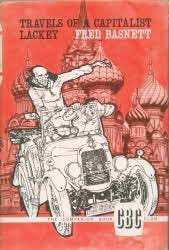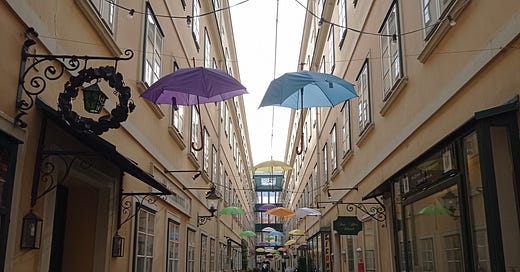Never-ending processes
Things often take longer than anticipated: a book update (along with a new word I've invented, a sad umbrella story and a recipe for something yummy)
How many of us underestimate how much time things will take?
We’re optimistic that we’ll get that essay done in less than an hour (or even less if you use ChatGPT) or that work project by the end of the week. This is not about procrastination. It’s about misanticipating how much time something will take, whether that’s learning a language, shaving your chest hair, making a meal from scratch or writing a book.
(misanticipating: this is not a real word. But I’m leaving it because I like it. Feel free to do that whenever you want, and then you can just call it what it is: a neologism. This is not quite the same as what George W Bush did when he used misunderestimate. That’s just wrong – you already have ‘under’ before estimate, which does the job fine.)
(One more digression before we get onto book updates: why do recipes so often get it wrong when it comes to the times? It will say 20 minutes of preparation and then 15 minutes of cooking, for example, when in reality it takes twice as long. Either they expect people to be superhuman slicers and dicers, or they think we all have teams of servants to do the dirty work for us. This is just one reason I hate following recipes. They also take the pleasure out of cooking, I find, but that can be counterbalanced by drinking when you cook, and the more you drink, the less you care about how it’s going to turn out.)
(On the other hand, recipes are great for language learners. If you cook and follow recipes, switch to English and kill two birds with one stone. Literally, if you’re eating poultry. There’s some great language in there like slice, dice, chop, quarter as well as prepositions: ‘Cut up into chunks and sizzle it with a dollop of butter…’ I’ve included an example of a recipe for toad in the hole at the end of this post.)
(This post is already taking longer than anticipated because of those two digressions – oh, the irony!)
My good friend and former colleague Mark wrote a book, and I loved his reason for doing so. He wanted to write a book that he would want to read. And that’s what I’m doing – or rather, what I’ve done, just about. It has gone in different directions from what I had originally anticipated (I guess I misanticipated it then – why is this not a real word?). I have no idea if it’s any good and if people will want to read it, but it is something I have wanted to do for a long time.
The financial journalist Jason Zweig captures my thoughts perfectly:
“The only book you should write is the book that is trapped inside of you, banging with both its fists on the inside of your rib cage, demanding to be let out.”
Around April 2022, that book was demanding to be let out, and so let it out I did.
The process and the results so far
From the very beginning, I decided I was going to self-publish. A few people have asked why. Throughout this process, I have repeatedly asked myself why. I’m still asking myself why.
1 I wouldn’t know how to pitch this to a publisher. I don’t know what genre it is and I am a terrible self-promoter or salesperson. It’s not an academic book. It’s not purely a guide for being a more effective language learner. It’s not a memoir. It’s not a philosophy book. It’s not a business book. It’s not a travel book.
It’s all of these things, wrapped into one. It’s an eclectic book.
I suppose the only genre it would fit into is Literary Non-fiction, if you could even call it ‘literary’.
2 It takes a lot of time and effort to find a publisher and I’m not writing this book to be famous or get rich. It’s a personal project and a goal I’ve had for a while, even though I’m not much of a goal-oriented person. I wanted to devote most of my efforts to the writing itself.
3 I wanted full creative control and to write exactly what I want. My philosophy is that if I like what I’ve written then I hope my readers will like it too. But I am also reminded of what Michael Lewis, author of Moneyball, The Big Short, Flash Boys and his latest book about Sam Bankman-Fried and the collapse of FTX, Going Infinite said: “The book you write and the book the public reads are often two different things.”
That doesn’t mean I’ve shunned editors. I’ve been fortunate to have had a team of friends, colleagues and students review chapters and offer valuable feedback and corrections. Some chapters just wrote themselves and needed little editing. Others might have had up to twenty revisions and total rewrites and even now, there are a couple that I just can’t get right. But I think it’s time to leave them and move on.
One funny note: when seeking the services of some freelance editors and in discussion with one that I was ready to choose, she responded with “let me know you’re thoughts.” My thoughts were “uh oh, if she’s an editor making such an egregious mistake like that, then forget it.”
4 Many years ago, when I thought I had turned my back on teaching, I was curious about the publishing industry and applied for a few jobs in that area. Bad timing: this was October 2008, right after the financial crisis and the collapse of all those banks.
This process has given me a revealing insight into how the publishing process works and how much work is involved.
5 Lastly, I get more of the royalties from a self-published book. It’s as simple as that. Even though I said I didn’t do this for the money, if I can make a bit to keep my family happy and healthy, then that will be a nice bonus. I’m not working at the moment – I like to say I’m ‘taking a sabbatical’, which makes it sound much better – and so I need to be able to provide for my daughter and the poor kid is tired of subsisting on bread and water. And I need some variety from my bread, coffee and beer diet.
Writers are really people who write books not because they are poor, but because they are dissatisfied with the books which they could buy but do not like.
Walter Benjamin, Illuminations: Essays and Reflections
So what’s taking so long?
Mainly, all of the “known unknowns”. I knew there would be a lot I didn’t know about, and this journey has been rewarding yet stressful. It’s much like doing a CELTA, joining a fraternity at university or spending time with your toddler: it’s the most fun you never want to have again.
1 Once the writing is done, the hard work begins: the editing, the revisions, the fact-checking, the self-doubt, the indecisiveness. And then there’s the formatting and the overwhelming options out there for services to help you. There has been a lot of research into the process – Reddit threads, YouTube tutorials, blogs, articles and on and on. I needed to educate myself on all of the possibilities. Remember FOMO from a previous post? It’s the same here. I want to thoroughly research all my options and cover all my bases.
2 Then there’s the cover design, layout, the fonts, styles and the footnote formatting – there are 235 of them! The cover design should be simple, but I’m overcomplicating it. I can’t even finalise my book title, for crying out loud.
Originally, I was only going to have an e-book. But a lot of people have said they’d like a physical copy, and so I have duly obliged, with pleasure. This means, however, more formatting.
3 One of the hardest parts and my current stumbling block is the book description. Trying to whittle it down to 150-200 words and capture the essence of what my book is about is damn hard. It’s such an eclectic, wide-ranging book and it’s challenging to boil it down into a concise re-telling. Brevity has never been my forte. (To put it another way: Keeping things brief has never been my strength – many languages use the same word, ‘forte’, but there are exceptions, like German, which uses Stärke.)
(Also, a couple of great phrasal verbs for you: whittle [it] down and boil [it] down. They are similar but there is a subtle difference between them – I’ll leave that for you to figure out, if you’re feeling ambitious.)
4 Being disciplined. Always an issue, especially because I lack the discipline to avoid reading stuff, whether books, news or articles.
5 Other life things get in the way. The everyday mundane stuff that keeps us all occupied, you know, like taking care of a kid and making sure she’s well fed and all that.
(‘Get in the way’: what a terrible way of putting it!)
6 Finally, an unexpected issue arose. I’ve got a lot of quotations and excerpts from books, poetry and music and I realised that there were going to be one or two copyright concerns. So I started the process of getting permission and then once I realised how long it was going to take, I had to revise quite a bit and unfortunately, that has meant cutting down on some of my quotations (manageable), scrapping a couple of poems (not such a big deal) and, in the end, cutting an entire chapter altogether about using song lyrics to help with grammar and vocabulary (a shame). I’ll work on getting permission for my sequel (ha ha).
“Work is the only answer. I have three rules to live by. One, get your work done. If that doesn’t work, shut up and drink your gin. And when all else fails, run like hell!”
Ray Bradbury
My biggest reading distraction(s)
These days, I don’t read as much travel writing as I used to, but occasionally I’ll dip into something new. A few months back I read my first Jan Morris book, Europe: An Intimate Journey. She’s a prolific travel writer, and I’m eager to read much more of her output.
Paul Theroux is another prolific travel writer that I had never read until recently, and The Great Railway Bazaar, about his journey by rail from Europe all the way across Asia and on to Japan, then back west on the Trans-Siberian railroad, was an absolute treat. I’m eager to read much more of his output.
Do you see why I lack the self-discipline to focus on one thing at a time? I’m eager to dive into more of his books, but alas…
My favourite travel writers and books
Anything and everything by Paddy Leigh Fermor and Ryszard Kapuściński, two of my all-time favourite writers. You’ll hear more about them in my book, notably about how Kapuściński even partially sabotaged a relationship in graduate school. I think his best books are The Soccer War, Shadow of the Sun and The Emperor.
Among the Russians (1983) and The Lost Heart of Asia (1994): Colin Thubron
Eastern Approaches (1949): Fitzroy Maclean
A Journey into Russia (1964): Laurens van der Post
I’ve always been partial to books about Eastern Europe and beyond, as you can see. But all of these writers have written close to 20 books, about different parts of the world. (I read these in the late 90s and early 2000s.)
The most unique and amusing book I’ve read about this part of the world is Travels of a Capitalist Lackey by Fred Basnett (1965), about two young Britons who toured Russia, Scandinavia, Finland and Turkey in a 1926 motor car. It’s now out of print, but if you can track it down, it’s well worth it. This was such an unexpected and delightful find. In 2006, just after my grandmother died, I was cleaning out her attic when I chanced upon it. It was dusty and in rough shape, but the title and cover image really caught my eye.

An umbrella story and an unanswered question
I lost my umbrella. Who cares, right?
This was the same umbrella I told you about before (from ‘This advice will change your life, part 1’), the one that I forgot on the tram and then sprinted like hell to intercept at the next stop and was able to retrieve it, out of breath, to the applause of a few passengers. In that same post, I talked about how I often lose umbrellas and how this damn umbrella had cost me 19 euros.
Everyone loses umbrellas. We know that, right? Think about how many you’ve lost in your lifetime. At least a dozen, probably. That’s why I stopped buying umbrellas years ago. I was tired of throwing away money.
But I didn’t want my poor daughter to get drenched, so I did the responsible parent thing and bought one.
We used it once or twice. We had a week of non-stop solid rain in July (in Vienna) and it was at the end of that period that I bought the umbrella. And then it barely rained after that, and rarely heavy enough to warrant an umbrella.
A couple of Sundays ago, out with my daughter, it was an overcast and potentially drizzly day. Forget weather forecasts – they’re never accurate. I had my umbrella just in case.
And then at one point I noticed it was gone. I’d left it somewhere.
We quickly retraced our steps, identifying one or two possible locations, but sadly, it was no more. I hope whoever found it appreciates what a fine and durable umbrella it is.
The worst part? It barely rained that day.
I am never buying another umbrella. I swear. This leads to one of many unanswered questions I have in life. The only other question is whether this question is also unanswerable: Why do so many people forget umbrellas? And why do people bother buying umbrellas when we lose them so much?
I bought my daughter a nice pair of wellingtons instead. That will have to do.
A recipe for toad in the hole
This is lovely for when the weather gets chillier. It’s great comfort food.
3 tbsp beef dripping or lard
6 sausages
2 eggs
100g plain flour, sifted
85ml whole milk
85ml ale
1tbsp wholegrain mustard
1. Preheat the oven to 220C. Heat half the fat in a frying pan over a medium heat and brown the sausages on all sides.
2. Meanwhile put the eggs in a large bowl and beat, preferably with an electric hand whisk, until thick. Beat in the flour and milk alternately until smooth, then stir in the ale and mustard and leave to sit for 15 minutes.
3. Put the remaining fat in a roasting tin and put in the oven to heat. Once the sausages are browned all over, and the batter has rested, take it out of the oven and put over a medium flame. Pour in the fat from the sausage pan, followed by the batter, which should sizzle as it hits the tin. Add the sausages and return to the oven.
4. Bake for about 35 minutes until well risen and golden, then serve immediately, preferably with good gravy and lots of peas.
© Felicity Cloake, The Guardian






Thanks! Some nice words like “stumbling block” or those couple of phrasal verbs- whittle down & boiling down and get in the way.
When the book supposed to be published? And after this, are you going to post here as well?
Claudia